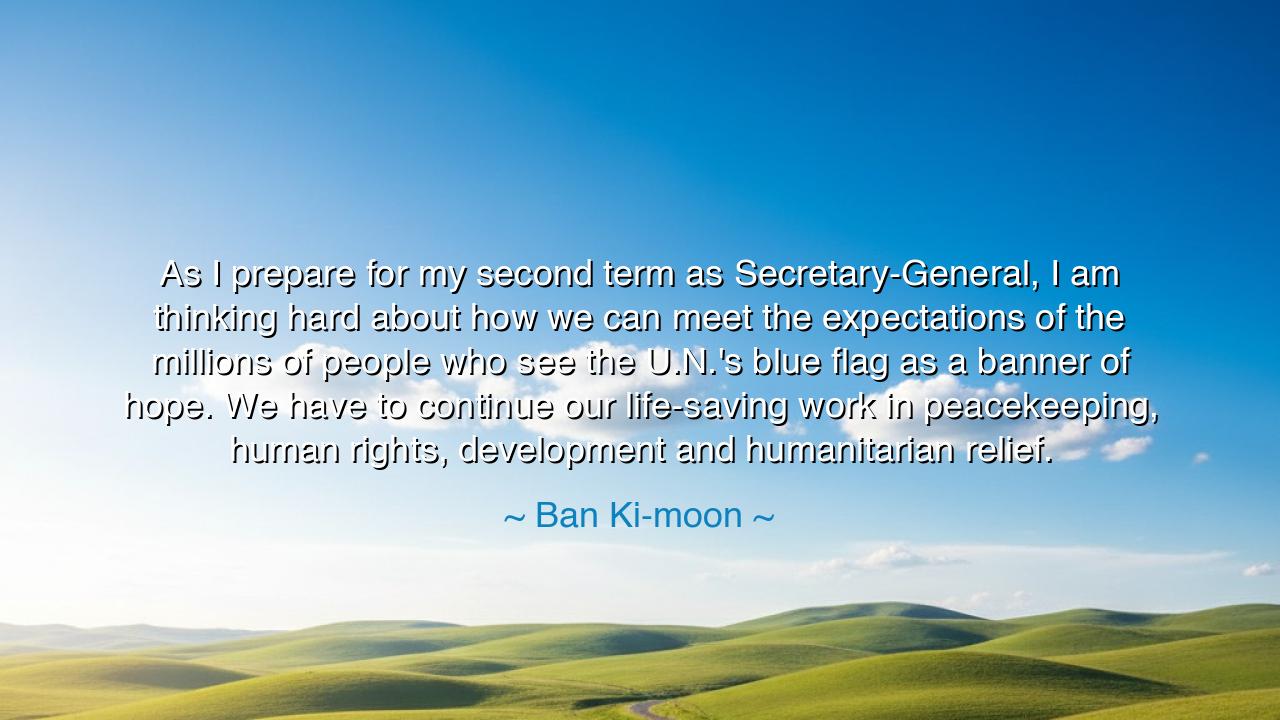
As I prepare for my second term as Secretary-General, I am
As I prepare for my second term as Secretary-General, I am thinking hard about how we can meet the expectations of the millions of people who see the U.N.'s blue flag as a banner of hope. We have to continue our life-saving work in peacekeeping, human rights, development and humanitarian relief.






“As I prepare for my second term as Secretary-General, I am thinking hard about how we can meet the expectations of the millions of people who see the U.N.'s blue flag as a banner of hope. We have to continue our life-saving work in peacekeeping, human rights, development and humanitarian relief.” – Ban Ki-moon
There are moments in history when one man’s words bear the weight of all humanity’s longing. When Ban Ki-moon, the Secretary-General of the United Nations, spoke these words, he stood as a servant not of one nation, but of all. In his voice was the quiet resolve of those who believe that hope is not a dream, but a duty. His mention of the U.N.’s blue flag—fluttering above cities torn by war, famine, and despair—was more than symbolism; it was a promise to the suffering, a vow that the world had not forgotten them. That banner of hope, like the ancient standards carried into battle, was not a decoration of power, but a shield for the defenseless.
The origin of this saying lies in the heart of the twenty-first century, an age of both progress and peril. The world, weary from conflict and shadowed by poverty, turned to the United Nations as once men turned to sacred altars for peace. And Ban Ki-moon, inheritor of this vast trust, spoke as one who understood that peacekeeping, human rights, and humanitarian relief were not mere tasks—they were sacred labors. His words came not from the seat of authority, but from the furnace of compassion. To be Secretary-General was, in his view, not to command, but to serve; not to boast of nations’ strength, but to protect their humanity.
Consider the vision of the blue flag—the color of the heavens, symbol of peace and vastness. It waves not for conquest, but for unity. Wherever it flies, it carries a message older than nations: that mankind is one family, and that the pain of one soul echoes in the hearts of all. When refugees flee through deserts, when children cry beneath broken roofs, when violence consumes villages and hearts alike, it is that blue banner that stands between despair and deliverance. It is a sign that the world still remembers mercy.
History offers us a mirror to these ideals. In the aftermath of the Rwandan genocide of 1994, when rivers ran red and the world wept for its silence, the United Nations sought redemption. Peacekeepers returned—not as conquerors, but as healers. They brought medicine instead of weapons, schools instead of prisons, dialogue instead of division. Though too late to save the dead, they came to save the living. And in that fragile effort, in the clearing of graves to plant seeds, the meaning of Ban Ki-moon’s words found its form: that hope must be rebuilt from ruin, and that even amid failure, the will to serve must not perish.
When he spoke of human rights, he spoke of the oldest law of all—the right of every man, woman, and child to live with dignity. For peace cannot be born from silence, nor justice from neglect. It is forged in the daily labor of compassion: in the feeding of the hungry, in the rebuilding of shattered homes, in the defense of the voiceless. His call was not to politicians alone, but to every heart capable of mercy. To him, development was not measured in gold or steel, but in the uplift of the spirit; humanitarian relief was not charity, but the purest expression of shared humanity.
O children of the earth, learn this truth: the banner of hope does not belong to the United Nations alone—it belongs to every soul who dares to believe that goodness can prevail. The blue flag is but cloth; its meaning lives in the hands that heal, the words that reconcile, the courage that acts when others look away. You too can raise that banner—in your home, in your community, in your heart. When you help a stranger, when you forgive an enemy, when you stand for truth though it costs you comfort, you continue the same life-saving work that Ban Ki-moon spoke of.
The lesson is eternal: peace is not the gift of governments, but the fruit of conscience. Let every man and woman be a keeper of that peace. Do not wait for great power to act; act where you stand. Feed one who hungers. Listen to one who suffers. Speak for one who is silenced. For as long as there are those who still raise their hands in kindness, the blue flag of hope will never fall. And when future generations ask what we did in the age of division, let them say: we chose compassion over cruelty, we chose unity over fear, we chose to be the keepers of peace.






AAdministratorAdministrator
Welcome, honored guests. Please leave a comment, we will respond soon